Horse News
Member
Weight loss tips for horses who want to fit in their “goal girths”
It can be challenging to achieve and maintain a healthy weight for your horse. In this article, we will discuss health risks to the overweight horse, the feed and exercise components to equine weight loss, and examples of how to objectively measure your horse’s progress. We have also included frequently asked questions related to these topics for a comprehensive understanding of this topic.
Horses gain weight when the calorie intake exceeds expenditure. To facilitate weight loss, it is best to use a two-pronged approach: diet and exercise. Determine what factors are within your control, decide on a method to measure progress, and implement changes slowly for the best results.
What Makes Horses Obese?
While horse weight issues can be extremely complex, the basic math is simple. It’s important to start with the big picture, and then dive into the details to determine the right plan to achieve and maintain a healthy weight.
If calorie intake is greater than calories expended, the result is weight gain.
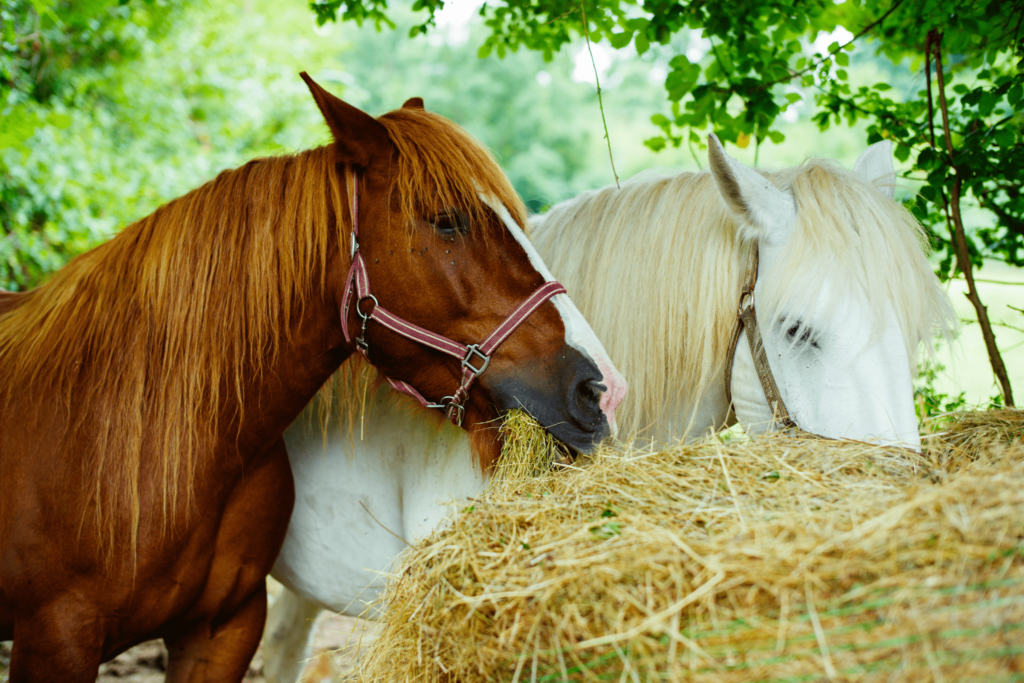
Source: Canva
Over time, this may lead to a horse becoming overweight, even obese. Overweight horses are prone to additional health risks—it is in their best interest for you to take action to promote a long and healthy life.
First, consider a typical day for your horse:
- Do they have access to turnout?
- To pasture?
- How many times a day are they fed?
- What does the diet consist of?
- How many times a week are they exercised, and what does that include?
Next, understand what is within your scope to change:
- Does your boarding stable dictate feed, or do you?
- Is more turnout an option?
- What type of exercise each week are you capable of providing?
- How do you track your horse’s weight?
Too Much or the Wrong Food
The equine digestive system is meant to process small quantities of food throughout the day. Humans generally divide feedings into morning and evening, because it is convenient for us.
If you are able to offer smaller, more frequent meals, it will benefit your horse.
Horses are generally fed hay and grain as part of their diet. Hay mimics the forage they would eat naturally and comes in different varieties depending on your geographic location and preferences. Generally, hay can be classified into two categories: grass hay or alfalfa hay. Grass hay is lower calorie, less rich, and contains less protein than alfalfa hay. Grain should typically only be added if the hay source does not provide enough energy or nutrients on its own.
A common mistake is feeding by volume and not weight.
Feed charts may be written out as “One scoop of sweet feed for Fluffy” or “Half a large coffee can of pellets for Star.” But do you know what that scoop (or coffee can) of grain weighs? Did you know corn test weight values can range from anywhere between 45 lbs/bushel to 60 lbs/bushel?
Growing conditions and moisture at harvest can drastically affect the weight of the feed. Your feed manufacturer doesn’t know what size scoop you are using, hence the reliance on using weight as a measurement instead of volume.
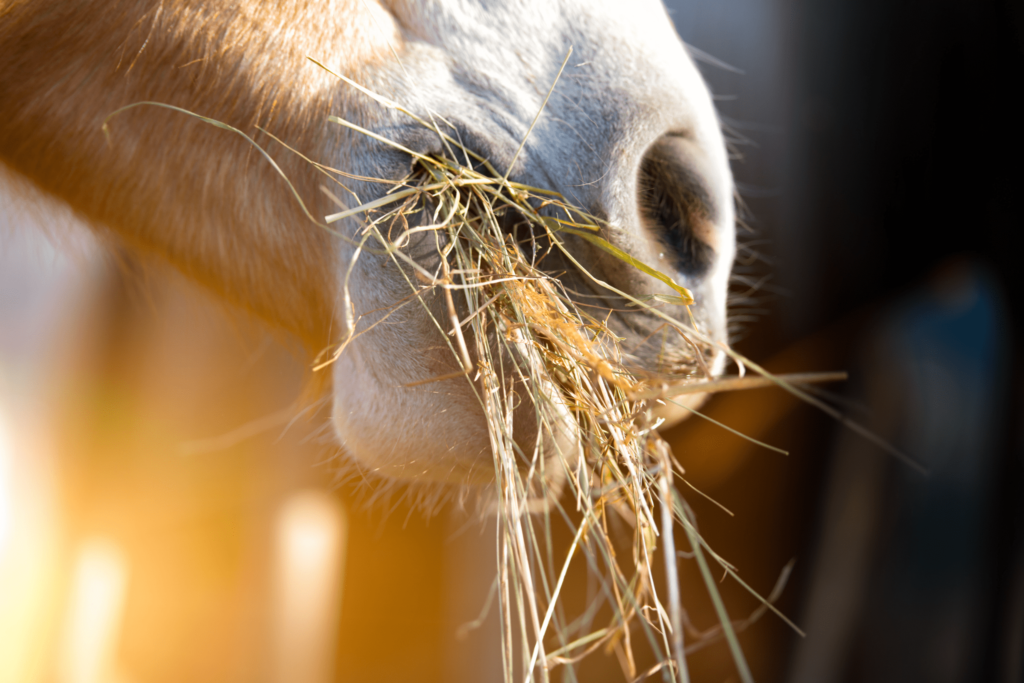
Source: Canva
Here is an extreme example for illustrative purposes:
- Hypothetically, one scoop of sweet feed normally weighs 1.5 lbs.
- The manufacturer changes the formula, and that same one scoop now weighs 2 lbs.
- As a result, Fluffy is getting up to 25% more calories per feeding, which can add up fast!
Different horses have different metabolisms. Some are “easy keepers” and others are “hard keepers.” For an easy keeper, you will want to feed a lower calorie feed and ensure the amount you are feeding still meets vitamin/mineral requirements. A hard keeper requires a higher calorie feed that likely wouldn’t be the best choice for an overweight horse.
Lack of Exercise
Horses move around quite a bit in the wild, as they forage over large acreage to find enough food. Exercise is important for physical well-being and mental health.
If you have limited access to turnout, it is important to include exercise in your horse’s daily routine.
This could include hand-walking, longing, or riding. If a horse is overweight or obese, evaluate how much exercise is included in a typical day and look at slowly increasing this for improved health and wellness.
Illness or Injury
If a horse is injured or becomes sick, typical daily exercise may be reduced. Especially in the case of an injury requiring stall rest, this change in exercise should be taken into consideration when calculating feed rations.
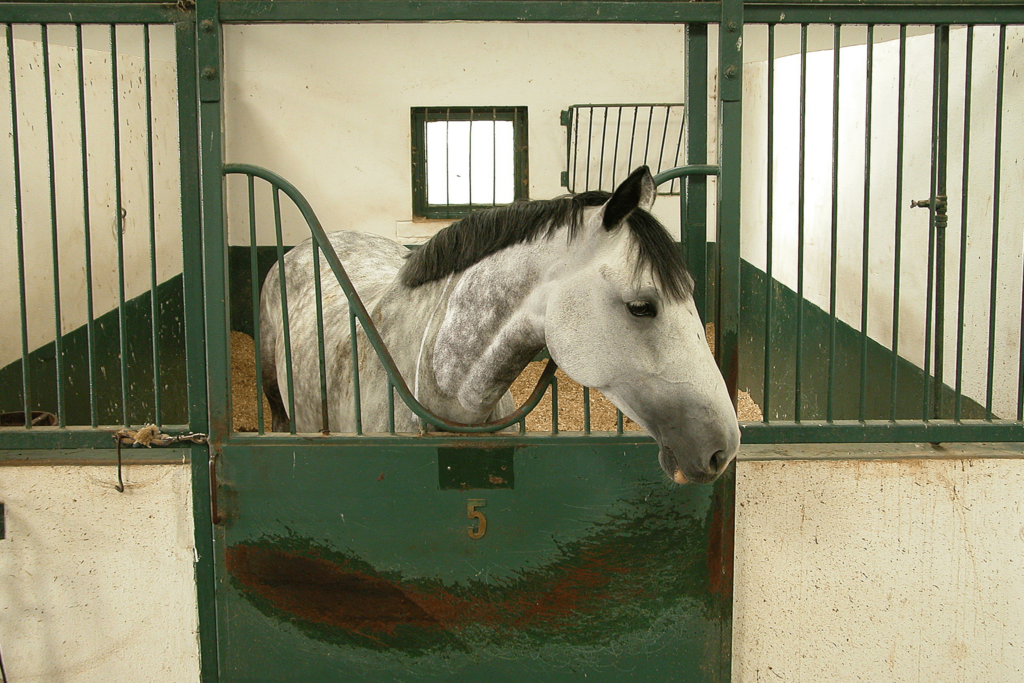
Source: Canva
For example, consider a performance horse that is accustomed to daily turnout and under-saddle work five days a week blows a tendon and is put on stall rest for six weeks. The daily feed ration should be evaluated and reduced to fit the reduced workload and prevent weight gain. To prevent boredom, it would be best to reduce the grain ration and continue frequent hay feedings.
Risks of Horse Obesity
An obese horse faces increased risk in many areas. These include:
- Additional strain on joints, tendons, ligaments, and hooves which leads to an increased chance of injury
- Reduced cardiovascular ability
- Increased chance of metabolic disorders such as laminitis or Cushing’s disease
- More difficulty in cooling the body
- Fatty tumors which can increase the risk of colic
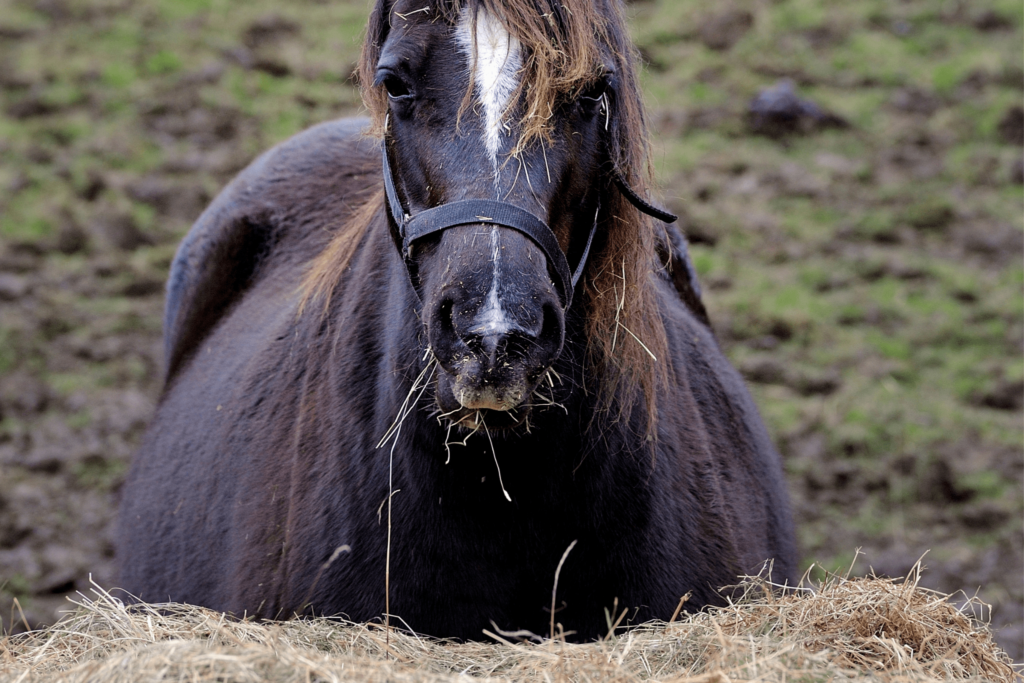
Source: Canva
How to Tell if Your Horse is Overweight
It can be easy to miss gradual weight gain in your horse, especially when you see them on a regular basis. Ask your vet for a neutral, third party opinion. Learning how to weigh your horse with a weight tape is helpful as it allows you to objectively measure your horse on a regular basis.
Getting a Baseline and Setting Goals
First, establish a baseline body condition score—this is a score of 1-9 with 1 being extremely thin and 9 being extremely fat. Ideally, horses should be in the 4 to 6 range, but this may vary depending on the horse’s job and workload.
Next, use a weight tape for a more specific baseline for your horse. Weigh your horse with the tape regularly and consistently, and document it to monitor changes over time.

Click to get horse weight tape at Amazon

Work with an equine nutritionist to set realistic goals for your horse—you don’t want to make abrupt changes to your horse’s diet.
How do you weigh a horse?
Most people don’t have access to a scale large enough to weigh a horse. Instead, invest in a weight tape for about $5. When used correctly, a weight tape can be a reasonably accurate way to weigh your horse and monitor changes.
This video shows how to use weight tape:
How long does it take for a horse to lose weight?
The amount of time it takes for a horse to lose weight varies drastically depending on the amount of weight that needs to be lost, the physical abilities of the horse, and the frequency of exercise that can be provided. For example, a healthy, slightly overweight horse with no underlying conditions will be able to lose weight faster than an obese horse with a history of lameness.
The Basics: How can I get my horse to lose weight?
The healthiest way to achieve weight loss is to implement both a diet and an exercise plan.
Change What or How You Feed
A small-hole hay net is very helpful in slowing down how quickly your horse eats. It occupies them longer, and is healthier as it keeps forage moving through the digestive tract. Consider a free-choice forage program. Gradually cut back on concentrates like grain, but ensure your horse is still getting adequate vitamins and minerals.
What do you feed an overweight horse?
Forage is important! If you only feed alfalfa, consider blending it with less-rich grass hay. Slowly decrease higher calorie concentrates, such as grain. Stop feeding treats. (Or substitute a handful of hay for a horse cookie.)
Are there any horse weight loss supplements?
Certain dietary components are thought to help facilitate weight loss. These include:
- Chromium (a trace mineral)
- L-carnitene (an amino acid)
- Zinc (a trace mineral)
If your horse is overweight because of a metabolic disorder, such as Cushing’s Disease or Equine Metabolic Syndrome, consult your vet to better understand if a medication or supplement could help.
Change Your Exercise Routine
If a horse is overweight or obese, increasing exercise can help to reach and maintain a healthy weight long term. Evaluate your current exercise routine and make adjustments as needed. Do you primarily go on leisurely trail rides? Consider adding in some lunging for more cardio.
How do fat horses get in shape?
Overweight horses should slowly increase their amount of physical activity each day. Gradual changes are key to avoid injury. Ensure enough time for warm-up to avoid injury, and give breaks as needed so the overweight horse doesn’t overheat.
What are the best exercises for horses to lose weight?
Daily exercise is important! Just 30 minutes of walking and trotting can help improve fitness and encourage weight loss. Work under saddle will burn more calories. Be sure to allow your horse time to warm up and cool down; remember overweight horses have a harder time cooling down their bodies.
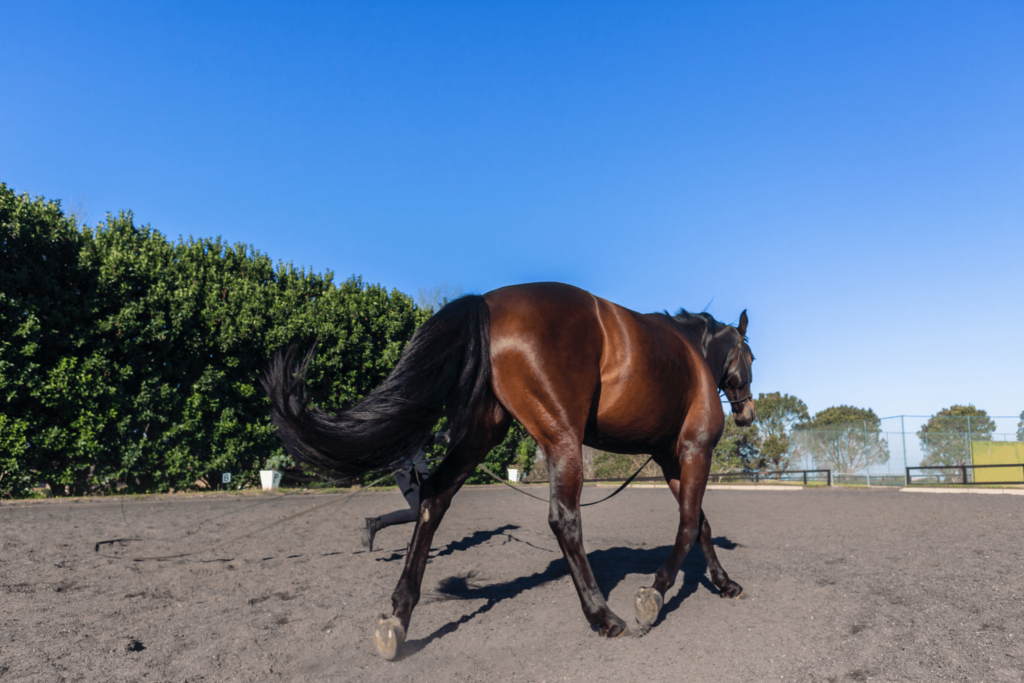
Source: Canva
What about lunging a horse for weight loss?
Lunging a horse can be an effective tool for increasing activity and promoting weight loss. Be sure to allow the horse time to warm up and exercise the horse equally in each direction.
Address Underlying Health Issues
Before embarking on a new diet or exercise regimen, be sure you are taking any pre-existing health issues into account. Consult your vet if you have questions about your horse’s capabilities or restrictions.
The Extremes: How can an obese horse lose weight?
An obese horse should have a weight loss plan that includes both diet and exercise. Gradual changes are key—you never want to make abrupt changes to the horse’s diet. Exercise will be difficult (at least at first) and should be slowly increased.
The obese horse’s heart and lungs are already under additional stress. The excess fat also makes it difficult for the horse’s body to cool down. Consult a vet or an equine professional to help establish the safest, most effective plan.
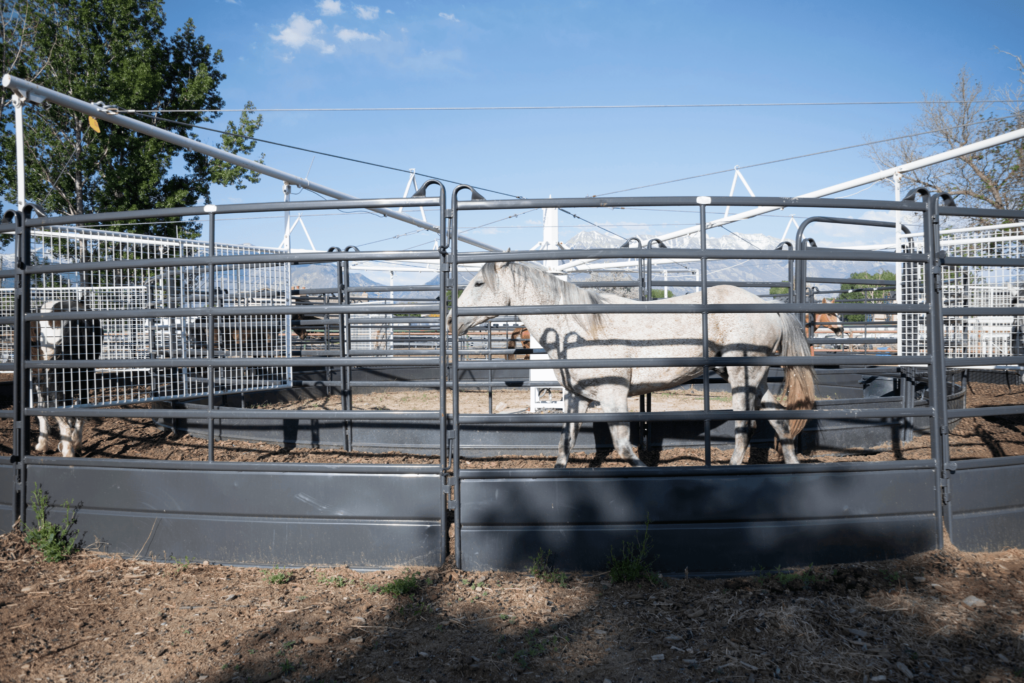
Source: Canva
Frequently Asked Questions
How do you prevent horse obesity?
Preventing weight gain is always easier than a weight loss program. Be sure to feed hay and grain by weight and not volume, regularly (and objectively) evaluate your horse’s body condition, and adjust feed based on workload.
What can cause rapid weight loss in horses?
Dental problems, parasites, or infection could cause rapid weight loss. Contact your vet if you suspect any of these issues.
Can worms in horses cause weight loss?
Parasites can cause weight loss in horses. If you suspect an infestation, talk to your vet. A fecal egg count test can quickly determine the best course of action.
Does Cushing’s cause weight loss in horses?
Cushing’s disease is caused by a malfunction of the pituitary gland and is more commonly observed in older horses.
Typical symptoms include long hair that doesn’t shed out in the spring, muscle wasting, a “potbelly” appearance, fatty deposits along the neck, and laminitis. While the potbelly and cresty neck may look like the horse is gaining weight, weight loss is also a symptom. This complex disease can be managed but not cured; reach out to your vet if you think your horse may have Cushing’s.
Is grass more fattening than hay?
Pasture is richer than hay; a horse on pasture will put weight on faster than a horse only fed a diet of hay. If your horse is gaining weight or overweight, access to pasture should be restricted. Cut down the number of hours on pasture per day or invest in a grazing muzzle to reduce consumption.

Click to see grazing muzzles at Amazon
 How quickly can a horse lose weight?
How quickly can a horse lose weight?

While horses can lose weight quickly, it is not healthy. To facilitate healthy weight loss and minimize the risk of colic from feed changes, only make gradual changes to the diet (for example, the maximum change when switching grain sources should be 10% per day).
How much weight can a horse lose in a week?
Horses can vary drastically in size—a Clydesdale can safely lose more pounds in a week than a Shetland pony. It’s important to establish a baseline that is unique to your horse, and work to put together a plan to facilitate weight loss. If you cut calories too fast, the horse’s body will go into “starvation mode” and slow down its metabolism, making it even harder to lose weight. Make small, gradual changes in diet and slowly increase physical activity to achieve healthy weight loss.
Where do horses lose weight first?
Horses tend to lose weight in their backs, ribs, and croup first.
Parting Thoughts
Overweight horses face many health challenges. If you think your horse is overweight, first objectively quantify your horse’s current situation. Next, figure out which factors are within your control and create a diet and exercise plan tailored to your horse’s individual needs. Track your progress and enlist the help of an equine professional if you have questions.
P.S. Enjoy this article? Trot on over to:
- How much does a horse weigh? (Fun facts, calculator, FAQs)
- Hard Keepers Made Easy: Horse Weight Gain for Beginners
- How to Weigh a Horse (Easy Step-by-Step Guide)
- 7 Biggest & Burliest Horse Breeds in the World
- Why (Good) Horseshoes Don’t Hurt Horses
- Food or Foe: What Do Horses Eat (And Why)?
- Elevate Your Ride: 6 Tall Horse Breeds
Sources/References:
https://ker.com/equinews/supplements-facilitating-weight-loss-horses/
https://www.proequinegrooms.com/tips/health-and-well-being/how-to-estimate-your-horse-s-weight
https://www.proequinegrooms.com/tips/health-and-well-being/dangers-overweight-horse
https://www.smartpakequine.com/content/overweight-horse
https://ker.com/equinews/overweight-horses-face-multiple-health-risks/
https://www.succeed-equine.com/succ...-loss-pt-2-assessing-your-horses-body-weight/
https://www.extension.iastate.edu/equine/body-condition-score
https://www.smartpakequine.com/content/video/best-exercises-for-an-easy-keeper
https://gettyequinenutrition.com/pages/the-best-and-safest-way-to-help-your-horse-lose-weight
The post The Biggest Loser: Horse Weight Loss Guide for Beginners appeared first on Horse Rookie.
Continue reading...
